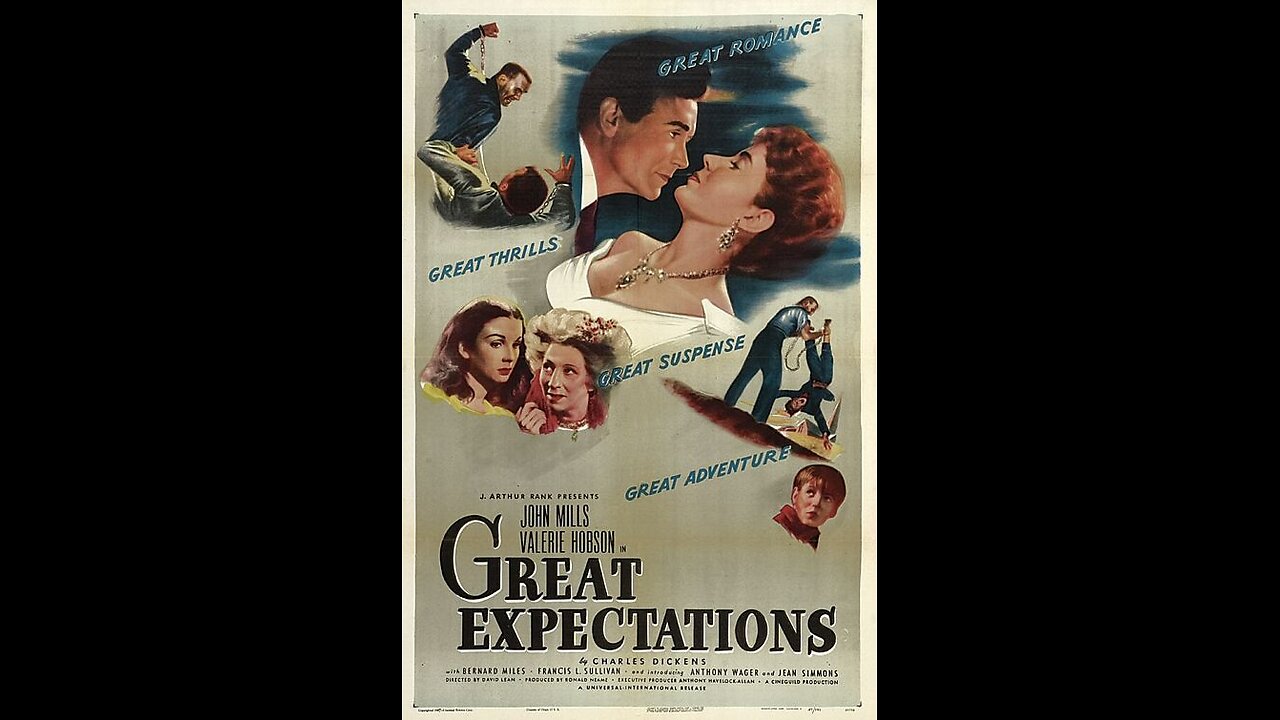Premium Only Content

Great Expectations 1946
The 1946 film adaptation of "Great Expectations" directed by David Lean is widely regarded as a cinematic classic. Here's a brief review:
Synopsis:
The film follows the story of Pip, an orphan who comes into a large fortune from an unknown benefactor, allowing him to rise above his humble beginnings. As he navigates through societal expectations, love, and personal growth, he encounters various characters, including the mysterious and eccentric Miss Havisham and the beautiful but cold Estella.
Key Points:
Atmosphere and Cinematography:
One of the standout features of the film is its atmospheric and moody cinematography. The use of black and white adds to the film's starkness, capturing the essence of Dickens' original work.
The marshes, the decaying mansion of Miss Havisham, and other settings are skillfully depicted, creating a visually compelling experience.
Characterization:
The characters are brought to life with memorable performances. John Mills as Pip delivers a nuanced portrayal, capturing the complexity of the character's journey.
Alec Guinness shines in his role as Herbert Pocket, providing humor and warmth to the narrative.
Faithfulness to the Source Material:
The film stays true to the essence of Dickens' novel, capturing its social commentary and vivid characterizations.
The adaptation successfully condenses the lengthy novel into a coherent and engaging cinematic experience without sacrificing its depth.
Emotional Resonance:
The film effectively conveys the emotional depth of the characters and their struggles. Pip's journey from a humble orphan to a young man grappling with societal expectations and unrequited love is portrayed with sensitivity.
Impact and Legacy:
"Great Expectations" (1946) is often cited as one of the greatest film adaptations of a Dickens novel. It received critical acclaim and several award nominations, including Academy Award nominations for Best Director and Best Art Direction.
In summary, the 1946 film adaptation of "Great Expectations" is praised for its evocative cinematography, strong performances, and fidelity to the source material. It remains a classic example of how literature can be successfully translated to the big screen.
-
 4:32
4:32
Movies, Videos, News and More
3 months agoEPA Administrator Lee Zeldin uncovered a $378 billion Democrat slush fund
742 -
 LIVE
LIVE
PudgeTV
2 hours ago🔵 Mod Mondays Ep 65 | The Italian CEO on Rumble | Business, Pizza & Streaming
45 watching -
 2:22:49
2:22:49
Robert Gouveia
4 hours agoArrest Gavin Newsom?? Insurrection Act! Mexico's Reconquista! Deportation Hearing!
20.1K29 -
 LIVE
LIVE
House of Jacobs
1 hour agoElden Ring NightReign Zero Skill, Full Send
24 watching -
 LIVE
LIVE
Fragniac
2 hours ago🔴 SPLITGATE 2 *NEW* BATTLE ROYALE w/ The @BrrrapPack ❗
64 watching -
 53:24
53:24
The Daily Signal
2 hours ago $0.27 earned🚨 BREAKING: Democrats Call for Nationwide Mobilization, U.S. Marines Deployed to Los Angeles
10.2K1 -
 27:43
27:43
Scary Mysteries
11 hours agoColorado’s 5 DARKEST Mysteries
3.74K2 -
 1:39:04
1:39:04
LIVE WITH CHRIS'WORLD
7 hours agoLIVE WITH CHRIS’WORLD - California is HELL On Earth | Americas Reaction
4.8K3 -
 49:24
49:24
Patriots With Grit
2 hours agoTrump's Hitman? | Vem Miller
4.18K2 -
 1:24:55
1:24:55
Alternatively - Formerly Conspiracy Pilled
5 hours agoLuke Part 2: Wilderness Training
12.8K1